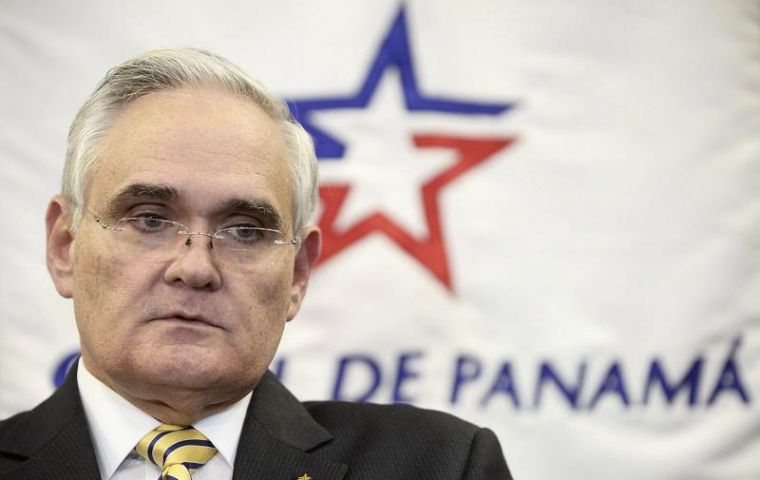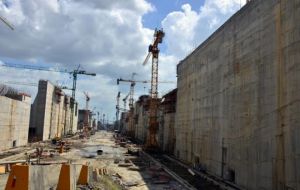MercoPress. South Atlantic News Agency
Panama Canal expansion halted; Spanish consortia says a 'final offer' has been made
 PCA administrator Jorge Quijano claimed the Spanish consortium had ceased all activities
PCA administrator Jorge Quijano claimed the Spanish consortium had ceased all activities A dispute over a 1.6 billion dollar cost overrun in the Panama Canal's expansion took a new twist Wednesday after a Spanish company leading the project denied it halted work over the spat.
The Panama Canal Authority said the consortium led by Spanish builder Sacyr had halted work after negotiations broke down, but the company later announced that it made a “final offer” to prevent a shutdown.
The two sides have clashed since December over unforeseen expenses in a project to widen the canal to accommodate massive cargo ships in the century-old waterway, which handles five percent of global maritime trade.
Panama Canal Authority administrator Jorge Quijano said the “inflexible position” of the consortium known as Grupos Unidos por el Canal (GUPC) had derailed the negotiations.
”They put a threat on the table, and today (Wednesday) they carried it out,“ he said.
”We demand the work be restarted immediately,“ Quijano said, adding that a proposal to cancel the GUPC contract is still on the table.
The Panamanian news agency ANPanamá showed pictures of empty workplaces at the locks with no activity and recalled that previous to the Wednesday shutdown, the contractors were already working ”at a much slower rate, 25% to 30%“.
In a statement, Sacyr said the Panama Canal Authority had decided to ”break off negotiations“ but company president Manuel Manrique later said that the company would keep the talks alive.
”What happened is that the ACP (canal authority) rejected our last proposal without proposing a viable alternative, and this is why we released the statement,“ Manrique told Spain's Cadena Ser radio.
”But later we sent a letter proposing to continue and so we will see what happens... We have made a final offer to the canal (authority),“ he said, adding that there was ”no concrete date“ to suspend the work.
”This depends on the response“ from the canal authority, Manrique added.
The project to widen the canal, one of the biggest civil engineering operations in the world, is due to be completed next year but GUPC has said that the dispute threatens to delay completion by up to five years.
In its earlier statement, Sacyr said the collapse of the talks ”puts in danger the widening of the canal and up to 10,000 jobs.“
Sacyr said that if a solution were not found immediately, Panama would face years of litigation before national and international courts ”on the events which have brought this project to the edge of failure.“
The European Union's industry commissioner, Antonio Tajani, who has mediated the dispute, warned that ”the interruption of the works would be bad news for employment, for the worldwide economy, for the expansion works of the canal.“
Spain's Public Works Minister Ana Pastor called for an agreement be found quickly ”because what is at stake is infrastructure that has an impact not only on the economy (of Panama) but also the world economy.“
The canal facilities are being widened to permit the passage of ships carrying up to 12,000 containers, twice the current limit.
But the disputed contract to build locks, due initially to be completed this year, was already running nine months late and since the beginning of this year work has slowed down further.
GUPC says that unforeseen costs total $1.6 billion beyond the initial $3.2 billion value of the contract.
GUPC is in dispute with the Panama Canal Authority mainly over who was responsible for the quality of geological information and who should bear the cost of problems and delays arising from unexpected geological difficulties.
The consortium is proposing that the two sides each pay half of the extra costs until the project is completed. They would then go before an international arbitration court for a decision on who is responsible for the unforeseen costs and who should pay.
Tajani said the breakdown was unexpected as the Panamanian president had said the previous day that the parties were ”very close” to an agreement.
The consortium warned at the end of December that it would suspend work in three weeks' time if Panamanian authorities did not provide the extra finance demanded, and the deadline for progress in the talks ended on Tuesday.
The canal, completed in 1914 to offer a short cut and safer journey for maritime traffic travelling between the Pacific and Atlantic oceans, is about 80 kilometers long and is used by 13,000-14,000 ships each year.





Top Comments
Disclaimer & comment rules-

-

-

Read all commentsSpanish crooks, little tinkers, aren't they?
Feb 06th, 2014 - 11:23 am 0Still, the other new canal will make this one obsolete, so no harm done!
Ha, ha, ha.
That's what you get choosing a bunch of chancers and crooks to do any “building work” for you. 30,000 expats in Spain can testify to the systemised robbery over “country land” being built on with the connivance of the local mayor and some “solicitors”.
Just the same bunch with the same mentality on a larger scale.
chrisR we both commented on this last week,
Feb 06th, 2014 - 08:06 pm 0these Spanish fools will fxck it all up,
Panama will learn a harsh lesson, before this canal is finished..lol
Sacyr: this is what happens when you bid for a contract in an honest country. They try and hold you to it.
Feb 06th, 2014 - 11:22 pm 0So low-balling - standard practice in ultra-corrupt Spain - won't work. Leaving Sacyr with no other choice than to get their friends in the PP to rob the Spanish taxpayers to get this job done.
Commenting for this story is now closed.
If you have a Facebook account, become a fan and comment on our Facebook Page!